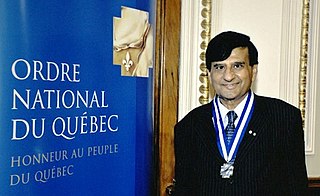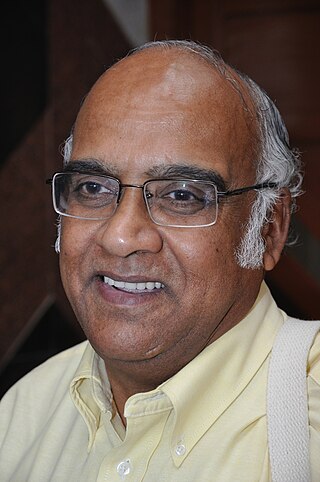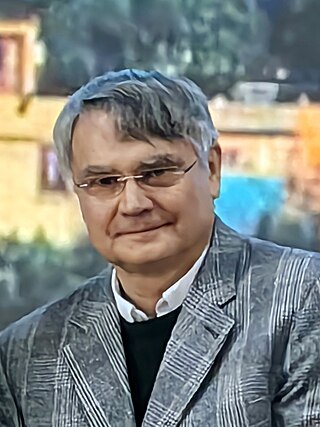Related Research Articles

The Royal Astronomical Society (RAS) is a learned society and charity that encourages and promotes the study of astronomy, solar-system science, geophysics and closely related branches of science. Its headquarters are in Burlington House, on Piccadilly in London. The society has over 4,000 members, known as fellows, most of whom are professional researchers or postgraduate students. Around a quarter of Fellows live outside the UK.

The Royal Society of Canada, also known as the Academies of Arts, Humanities, and Sciences of Canada, is the senior national, bilingual council of distinguished Canadian scholars, humanists, scientists, and artists. The primary objective of the RSC is to promote learning and research in the arts, the humanities, and the sciences. The RSC is Canada's national academy. It promotes Canadian research and scholarly accomplishment in both official languages, recognizes academic and artistic excellence, and advises governments, non-governmental organizations, and Canadians on matters of public interest.
Post-nominal letters, also called post-nominal initials, post-nominal titles, designatory letters, or simply post-nominals, are letters placed after a person's name to indicate that the individual holds a position, an academic degree, accreditation, an office, a military decoration, or honour, or is a member of a religious institute or fraternity. An individual may use several different sets of post-nominal letters, but in some contexts it may be customary to limit the number of sets to one or just a few. The order in which post-nominals are listed after a name is based on rules of precedence and what is appropriate for a given situation. Post-nominal letters are one of the main types of name suffix. In contrast, pre-nominal letters precede the name rather than following it, such as addressing a physician or professor as "Dr. Smith".

The Royal Society of Chemistry (RSC) is a learned society and professional association in the United Kingdom with the goal of "advancing the chemical sciences". It was formed in 1980 from the amalgamation of the Chemical Society, the Royal Institute of Chemistry, the Faraday Society, and the Society for Analytical Chemistry with a new Royal Charter and the dual role of learned society and professional body. At its inception, the Society had a combined membership of 34,000 in the UK and a further 8,000 abroad.

Fellowship of the Royal Society is an award granted by the Fellows of the Royal Society of London to individuals who have made a "substantial contribution to the improvement of natural knowledge, including mathematics, engineering science, and medical science".
William-Henry Gauvin was Canadian chemical engineer. He was also an educator and championed industry-university-governmental research in Canada.
Craig Jon Hawker is an Australian-born chemist. His research has focused on the interface between organic and polymer chemistry, with emphasis on the design, synthesis, and application of well-defined macromolecular structures in biotechnology, microelectronics, and surface science. Hawker holds more than 45 U.S. patents, and he has co-authored over 300 papers in the areas of nanotechnology, materials science, and chemistry. He was listed as one of the top 100 most cited chemists worldwide over the decade 1992–2002, and again in 2000–2010.

Atta-ur-Rahman, is a Pakistani organic chemist and is currently serving as Professor Emeritus at the International Center for Chemical and Biological Sciences at the University of Karachi and as Chairman of PM Task Force on Science and Technology. He has twice served as the President of Pakistan Academy of Sciences. He was the Federal Minister of Science and Technology (2000-2002), Federal Minister of Education (2002) and Chairman Higher Education Commission with status of Federal Minister (2002-2008) He is also the President of the Network of Academies of Sciences in Countries of the Organisation of Islamic Countries (NASIC). After returning to Pakistan from Cambridge after completing his tenure as Fellow of Kings College, Cambridge University, he contributed to the development of the International Center for Chemical and Biological Sciences at the University of Karachi, and transforming the landscape of higher education, science and technology of Pakistan. He is Fellow of Royal Society (London), Life Fellow of Kings College, Cambridge University, UK.,, Academician Chinese Academy of Sciences and Professor Emeritus at University of Karachi

The Institution of Chemical Engineers (IChemE) is a global professional engineering institution with 30,000 members in 114 countries. It was founded in 1922 and awarded a Royal Charter in 1957.

Ashok K. Vijh, is an Indian born Canadian chemist. He was born in Punjab but moved to Canada in 1962.

Michael Lawrence KleinNAS is Laura H. Carnell Professor of Science and director of the Institute for Computational Molecular Science in the college of science and technology at Temple University in Philadelphia, US. He was previously the Hepburn Professor of Physical Science in the Center for Molecular Modeling at the University of Pennsylvania.
Véronique Gouverneur is the Waynflete Professor of Chemistry at Magdalen College at the University of Oxford in the United Kingdom. Prior to the Waynflete professorship, she held a tutorial fellowship at Merton College, Oxford. Her research on fluorine chemistry has received many professional and scholarly awards.

Eugenia Eduardovna Kumacheva is a University Professor and Distinguished Professor of Chemistry at the University of Toronto. Her research interests span across the fields of fundamental and applied polymers science, nanotechnology, microfluidics, and interface chemistry. She was awarded the L'Oréal-UNESCO Awards for Women in Science in 2008 "for the design and development of new materials with many applications including targeted drug delivery for cancer treatments and materials for high density optical data storage". In 2011, she published a book on the Microfluidic Reactors for Polymer Particles co-authored with Piotr Garstecki. She is Canadian Research Chair in Advanced Polymer Materials. She is Fellow of the Royal Society (FRS) and a Fellow of the Royal Society of Canada (FRSC).

Swaminathan Sivaram is an Indian polymer chemist, inventor, institution builder and a former director of the National Chemical Laboratory, Pune. He is known for his pioneering work on alkylation of tertiary alkyl halides with trialkylaluminum and olefin polymerization and holds the highest number of US patents by an Indian working outside the US. He is a fellow of several significant professional organizations. The Government of India awarded him the fourth highest civilian honour of the Padma Shri, in 2006, for his contributions to Indian science.
The Society of Chemical Industry (America Section) or SCI America is an independent learned society inspired by the creation of the Society of Chemical Industry (SCI) in London in 1881. Originally known as the New York Section, it was formed in 1894 and officially renamed the America Section in 1919. The main activity of the America Section is the awarding of several prizes in chemistry: the Perkin Medal, the Chemical Industry Medal and the Gordon E. Moore Medal. The America Section also works with the American Chemical Society (ACS) and the American Institute of Chemical Engineers (AIChE) to support underserved and Black scholars in chemistry and chemical engineering.
Douglas Wade Stephan is professor of Chemistry at the University of Toronto, a post he has held since 2008.
Francesca M. Kerton is a green chemist and Professor of Chemistry at Memorial University of Newfoundland, Canada.

Janusz Boleslaw Pawliszyn is a Polish chemist. He is a Canada Research Chair at the University of Waterloo and Natural Sciences and Engineering Research Council of Canada Industrial Research Chair in New Analytical Methods and Technologies.
Stephanie MacQuarrie is an organic materials chemist and a Professor of Chemistry at Cape Breton University. Her research has spanned many areas of chemistry, including organic synthesis, organometallic catalysis, and materials characterization. She has contributed to the use of biochar as a green material for use in various chemical processes, including collaboration with Professor Francesca M. Kerton. In 2021, she was elected as the Director for Equity, Diversity, and Inclusion for the Canadian Society for Chemistry. She was recognized by the Cape Breton University Alumni Award for Teaching Excellence in 2017. In 2023, she was named one of the inaugural NSERC Chairs for Inclusion in Science and Engineering. She was elected as a Fellow of the Chemical Institute of Canada (FCIC) in 2024.
References
- ↑ "CIC Awards" (PDF). Chemical Institute of Canada. 2018. Archived from the original (PDF) on 4 August 2015. Retrieved 13 September 2018.
- ↑ "Canada International". Society of Chemical Industry. Retrieved 16 August 2016.